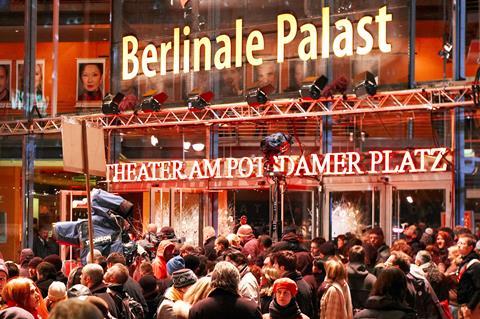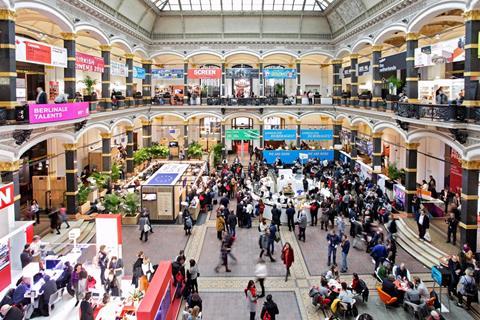
Preparations are underway to hold the 71st Berlinale on-site as a physical event in the German capital from February 11-21 despite an acknowledgment from the organisations the event might have to be cancelled due to the Covid-19 pandemic.
The decision is dependent on whether infection rates in Germany and elsewhere continue to rise and more restrictions will need to be introduced by the German authorities to curb the spread of the virus.
“It is difficult at the moment to determine a time [when a decision would be made on staging the Berlinale in February] because the situation with the coronavirus is constantly changing,” said Frauke Greiner, head of press at the Berlinale. “We hope the current so-called “circuit breakers” will have an effect.“
“A decision about a possible cancellation can only be taken if the official regulations suggest this,” she explained. “At the moment, such a decision would still be too early.”
EFM changes
Meanwhile, the European Film Market (February 11-18), which will operate as a hybrid event, has decided Festival, Press, Student and Guest Accreditation badge holders will not have access to the market’s main venue in the Gropius Bau for any period due to Covid restrictions.
Holders of the Market Badge or the Festival Accreditation/Market Badge categories will be the only ones granted access to this location, with buyers and stand holders having priority access.
Speaking exclusively to Screen, the EFM’s new director Dennis Ruh said: “We aim to provide the best market experience possible for our guests. The Gropius Bau will remain the meeting point for the international sales business, but for Market Badge holders.“
He added journalists planning coverage of the EFM will be offered “individual access possibilities“ while the access regulations to other market venues such as the Marriott Hotel “will depend on the restrictions which will be in place in February“.
Ruh noted the EFM’s market screenings will be focused in venues at Potsdamer Platz – the 19 screens of the CinemaxX multiplex, the two Arsenal Kino screens, the DFFB film school’s two screens, and the cinema in the basement of the Gropius Bau –and additional screening facilities will be added later on in the coming weeks.
“So far, we do not plan to significantly reduce the number of market screenings, but this will of course depend on the right holders’ requests,“ he said.
One piece of good news for those applying for market accreditation is that the registration fees have been cut this year by between 10%-16% for the Market Badge and Festival Accreditation & Market Badge categories.
According to Ruh, the price reduction had been made given that the EFM’s conference programme had moved online and would be focusing on a smaller number of sessions.
Early bird registration by December 6 for the Market Badge will cost only €210 (compared to €250 for 2020) with the regular rate until 12 January set at €255 (compared to €300 for 2020).
Meanwhile, the combined category of Festival Accreditation & Market Badge will set professionals back by €335 (2020: €375) for the early bird rate, rising to €380 for the regular rate until 12 January (2020: € 425).
At the same time, the standard Festival Accreditation has been pegged at €125 as in previous years, while the charge for Press Accreditation stays at €60.

As part of the EFM’s decision to adopt a hybrid format for its 2021 edition, the market has introduced the Online Market Badge for those professionals who have already decided not to travel to Berlin next February and would prefer to follow the market from home.
This new – non-refundable - category at a cost of €89 will give access to various online features such as the EFM Industry Sessions and Online Screenings.
“In times of travel restrictions, it is clear that there is the need for online screenings to also reach distributors and festival programmers around the world,“ Ruh explained. “Films will be available in every time zone at the same time as indicated in the screening schedule.“
Moreover, the EFM is also giving professionals who have bought a Market Badge and are then unable to come to Berlin, the chance to participate in the market’s online services through the Online Market Badge if they apply to the market for their badge to be ‘converted“ by February 11. The difference in price between the Market Badge and Online Market Badge would then be refunded.
As to the question of whether the Gropius Mirror restaurant opposite the EFM’s main venue will be able to operate during the upcoming market, Ruh said “this is still in negotiation and the catering concepts need to be adapted to the regulations in February“.
Meanwhile, those with a press badge and attending on site will be required to register online or obtain a ticket to attend press and festival screenings, press conferences or other festival section events due to the likely reduced capacity of venues.
Furthermore, Frauke Greiner noted “some press services will no longer be offered in the press centre [at the Grand Hyatt Hotel] in 2021“, but will be relocated in the Debis Atrium.
“These include the journalists’ writing room which will now be completely in the Debis Atrium and will offer workstations and WLAN to the press, but they will have to bring their own laptops, tablets, etc,“ she explained.
This was the procedure adopted by the Venice Film Festival in September.
Germany’s four-week partial national lockdown went into effect on November 2 for a month until at least the beginning of December. Until then, bars, restaurants, cinemas, theatres and music venues are all closed and households can only meet with one other household in groups of up to 10 people. Cinemas are planning to reopen on December 3.
At present, Germany requires every arrival from a high-risk country - including most European countries and the US - must self-isolate for 10 days and then take a Covid test.

























No comments yet